Related Research Articles
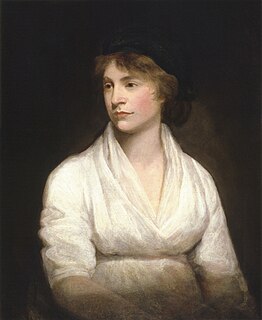
Mary Wollstonecraft was an English writer, philosopher, and advocate of women's rights. Until the late 20th century, Wollstonecraft's life, which encompassed several unconventional personal relationships at the time, received more attention than her writing. Today Wollstonecraft is regarded as one of the founding feminist philosophers, and feminists often cite both her life and her works as important influences.

Screwball comedy is a subgenre of the romantic comedy genre that became popular during the Great Depression, originating in the early 1930s and thriving until the early 1940s. It satirized the traditional love story. Many secondary characteristics of this genre are similar to film noir, but it distinguishes itself for being characterized by a female that dominates the relationship with the male central character, whose masculinity is challenged. The two engage in a humorous battle of the sexes, which was a new theme for Hollywood and audiences at the time. What sets the screwball comedy apart from the generic romantic comedy is that "screwball comedy puts its emphasis on a funny spoofing of love, while the more traditional romantic ultimately accents love." Other elements of the screwball comedy include fast-paced, overlapping repartee, farcical situations, escapist themes, physical battle of the sexes, disguise and masquerade, and plot lines involving courtship and marriage. Screwball comedies often depict social classes in conflict, as in It Happened One Night (1934) and My Man Godfrey (1936). Some comic plays are also described as screwball comedies.

Amantine Lucile Aurore Dupin, best known by her pen name George Sand, was a French novelist, memoirist, and journalist. One of the more popular writers in Europe in her lifetime, being more renowned than both Victor Hugo and Honoré de Balzac in England in the 1830s and 1840s, Sand is recognised as one of the most notable writers of the European Romantic era.

Sexual themes are frequently used in science fiction or related genres. Such elements may include depictions of realistic sexual interactions in a science fictional setting, a protagonist with an alternative sexuality, a sexual encounter between a human and a fictional extraterrestrial, or exploration of the varieties of sexual experience that deviate from the conventional.
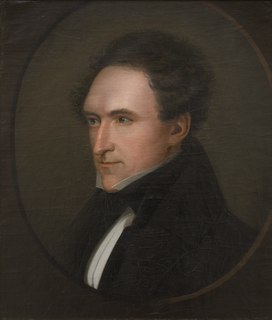
Carl Jonas Love Ludvig Almqvist was a Swedish author, romantic poet, realist, composer and social critic.

Regency romances are a subgenre of romance novels set during the period of the British Regency (1811–1820) or early 19th century. Rather than simply being versions of contemporary romance stories transported to a historical setting, Regency romances are a distinct genre with their own plot and stylistic conventions. These derive not so much from the 19th-century contemporary works of Jane Austen, but rather from Georgette Heyer, who wrote over two dozen novels set in the Regency starting in 1935 until her death in 1974, and from the fiction genre known as the novel of manners. In particular, the more traditional Regencies feature a great deal of intelligent, fast-paced dialogue between the protagonists and very little explicit sex or discussion of sex.
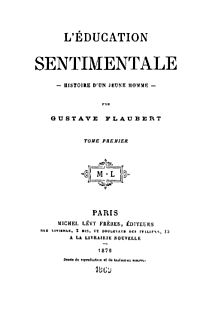
Sentimental Education is a novel by Gustave Flaubert. Considered one of the most influential novels of the 19th century, it was praised by contemporaries such as George Sand and Émile Zola, but criticised by Henry James. The story focuses on the romantic life of a young man at the time of the French Revolution of 1848.

Geraldine Endsor Jewsbury was an English novelist, book reviewer and literary figure in London, best known for popular novels such as Zoe: the History of Two Lives and reviews for the literary periodical the Athenaeum. Jewsbury never married, but enjoyed intimate friendships, notably with Jane Carlyle, wife of the essayist Thomas Carlyle. Jewsbury's romantic feelings for her and the complexity of their relations appear in Jewsbury's writings. She also encouraged other people, such as Walter Mantell, to try new things.

As a literary genre of high culture, heroic romance or chivalric romance is a type of prose and verse narrative that was popular in the noble courts of High Medieval and Early Modern Europe. They were fantastic stories about marvel-filled adventures, often of a chivalric knight-errant portrayed as having heroic qualities, who goes on a quest. It developed further from the epics as time went on; in particular, "the emphasis on love and courtly manners distinguishes it from the chanson de geste and other kinds of epic, in which masculine military heroism predominates."
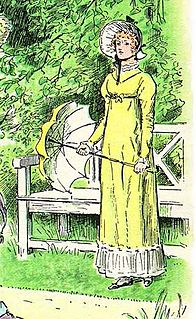
Elizabeth Bennet is the protagonist in the 1813 novel Pride and Prejudice by Jane Austen. She is often referred to as Eliza or Lizzy by her friends and family. Elizabeth is the second child in a family of five daughters. Though the circumstances of the time and environment push her to seek a marriage of convenience for economic security, Elizabeth wishes to marry for love.
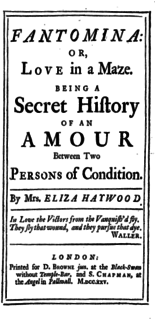
Amatory fiction is a genre of British literature that became popular during the late 17th century and early 18th century, approximately 1660-1730. It was often spread throughout coteries, published while trying to remain true to the writer's vision without criticism. Amatory fiction predates, and in some ways predicts, the invention of the novel and is an early predecessor of the romance novel. Indeed, many themes of the contemporary romance novel were first explored in amatory fiction. The writing of amatory fiction work was dominated by women, and it was considered to have mainly female readers; but it is assumed that men read these novels as well. As its name implies, amatory fiction is preoccupied with sexual love and romance. Most of its works were short stories.

Indiana is a novel about love and marriage written by Amantine Aurore Dupin; it was the first work she published under her pseudonym George Sand. Published in April 1832, the novel blends the conventions of romanticism, realism and idealism. As the novel is set partly in France and partly in the French colony of Réunion, Sand had to base her descriptions of the colony, where she had never been, on the travel writing of her friend Jules Néraud.
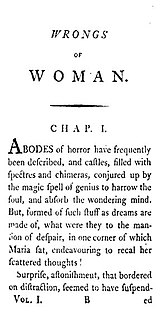
Maria: or, The Wrongs of Woman is the 18th-century British feminist Mary Wollstonecraft's unfinished novelistic sequel to her revolutionary political treatise A Vindication of the Rights of Woman (1792). The Wrongs of Woman was published posthumously in 1798 by her husband, William Godwin, and is often considered her most radical feminist work.

Mauprat is a novel by the French novelist George Sand about love and education. It was published in serial form in April and May 1837. Like many of Sand's novels, Mauprat borrows from various fictional genres — the Gothic novel, chivalric romance, the Bildungsroman, detective fiction and the historical novel.

Chick flick is a slang term, sometimes used pejoratively, for the film genre catered specifically to women's interests, and is marketed towards women demographics. They generally tends to appeal more to a younger female audience and deals mainly with love and romance. Although many types of films may be directed towards a female audience, the term "chick flick" is typically used only in reference to films that contain personal drama and emotion or themes that are relationship-based. Chick flicks often are released en masse around Valentine's Day. Feminists such as Gloria Steinem have objected to terms such as "chick flick" and the related genre term "chick lit", and a film critic has called it derogatory.
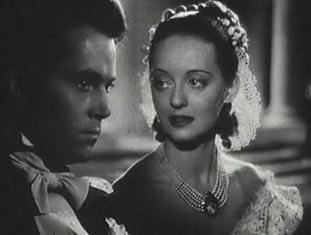
The woman's film is a film genre which includes women-centered narratives, female protagonists and is designed to appeal to a female audience. Woman's films usually portray "women's concerns" such as problems revolving around domestic life, the family, motherhood, self-sacrifice, and romance. These films were produced from the silent era through the 1950s and early 1960s, but were most popular in the 1930s and 1940s, reaching their zenith during World War II. Although Hollywood continued to make films characterized by some of the elements of the traditional woman's film in the second half of the 20th century, the term itself disappeared in the 1960s. The work of directors George Cukor, Douglas Sirk, Max Ophüls, and Josef von Sternberg has been associated with the woman's film genre. Joan Crawford, Bette Davis, and Barbara Stanwyck were some of the genre's most prolific stars.
Jacques (1833) is a novel by French author George Sand, née Amantine Dupin. The novel centers on an unhappy marriage between a retired soldier, aged 35 (Jacques), and his young teenaged bride, Fernanade. The novel is the first by Sand to be named after a male character. While previously, her novels had focused on female experiences within marriage, in Jacques, she turns her attention to describing a male partner in a marriage. The novel details how he feels about ongoing events in often painful detail.
Marie Du Fresnay, aka Maria du Fresnay, née Daminois, was a French writer who was born in 1809 and died in 1892.
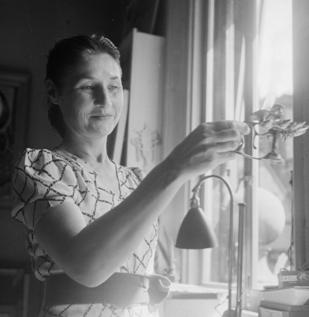
Valentine Penrose, was a French surrealist poet, author, and collagist.
Western Romance literature denotes a genre subset of Romance literature, sometimes referred to as cowboy romance. Works within this category typically adhere to the characteristics of Romance but take place in a western setting, frequently the American frontier. Though often historical, the genre is not restricted to romantic works set in the period of American settlement but extends to contemporary romantic works that centre around cowboys or other tropes of the western genre.
References
Source text:
Review (in French)
Literary criticism:
- Aimée Boutin, Out of Place: Family Dysfunction and Displacement in Valentine, Romantic Review 96(3/4): 311–324.
| | This article about an 1830s novel is a stub. You can help Wikipedia by expanding it. See guidelines for writing about novels. Further suggestions might be found on the article's talk page. |
